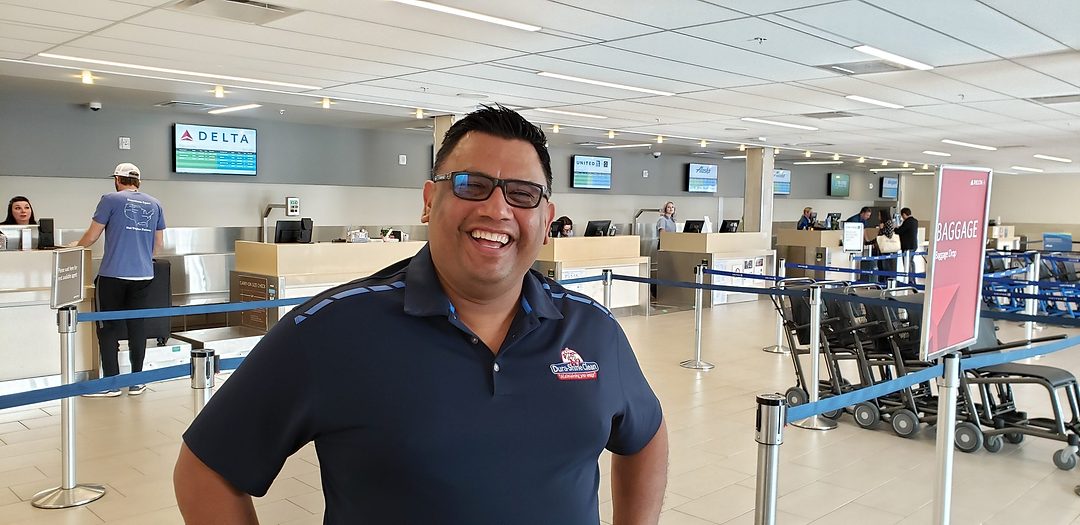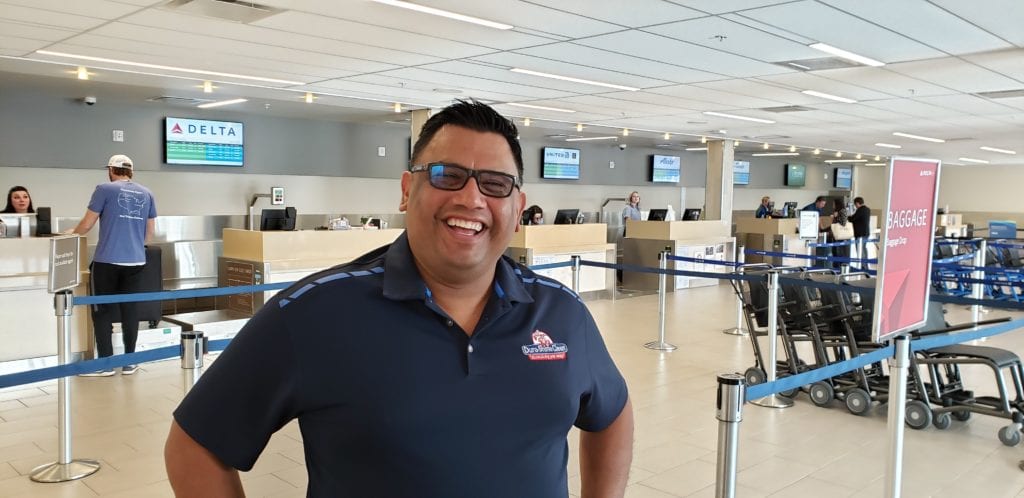
Home » Tri-City cleaning company stands ready to scrub out coronavirus
Tri-City cleaning company stands ready to scrub out coronavirus

March 6, 2020
As questions and concerns poured in after officials confirmed 11 coronavirus deaths in Washington, Carlos Martinez called an emergency meeting of the 70-plus employees of Dura-Shine Clean, his commercial cleaning business.
Dura-Shine cleans 5 million square feet of commercial space in the Tri-Cities, with clients ranging from banks to professional offices to the Tri-Cities Airport.
Cleaners are at the front line of the battle to prevent the spread of coronavirus. Workers were worried and wanted information about staying safe on the job.
And while it’s an opportunity Martinez didn’t seek out, he said he’s ready for it. He is advertising his business as the Tri-Cities’ “Coronavirus Busters.”
As COVID-19 reports mounted across Washington and Oregon, the calls from worried customers rolled in with requests to increase the frequency of cleaning or to ensure the company could help if a business needed to be decontaminated after a verified exposure.
“It’s been nuts,” he said.
Notably, Pasco airport managers instructed Dura-Shine to take over disinfection duties that had been the responsibility of tenants, including airlines.
More cases than reported?
There were no COVID-19 cases reported in the Tri-Cities as of the time this was written, but it’s a matter of time, according to local health officials.
As of March 6, the Washington Department of Health reported 11 deaths and 79 positive tests for coronavirus, including one in Grant County. Still more were quarantined because of potential exposure.
There are probably far more that haven’t been detected, according to an analysis by a computational biologist at the Fred Hutchinson Cancer Research Center.
Trevor Bedford calculates there are at least 500 to 600 cases in Seattle, according to STAT, a newsletter that covers health and science news.
Regional response
On the day Martinez summoned his employees to talk about staying safe, Wildhorse Resort & Casino east of Pendleton, Oregon, shut down after a worker tested positive and was taken across the state line to a Walla Walla hospital. It reopened March 4 after a 48-hour voluntary closure.
The Wildhorse campus, including casino, hotel, theater, arcade, offices and restaurants were manually cleaned and disinfected with Clorox before being certified by environmental health officials and regulators.
In Washington, where a Life Care Center in Kirkland is at the center of the outbreak, Gov. Jay Inslee has declared a state of emergency and hosted Vice President Mike Pence, who called the state a model. The House and Senate unanimously voted to allocate $100 million to combat the virus.
King County announced it was buying a motel in Kent where it planned to isolate patients. The state health department established a quarantine and isolation facility in Thurston County.
Economic crisis in the making?
Conferences are being called off. School children are being kept home. Employers such as the Pacific Northwest National Laboratory are scaling back travel and advising workers to think twice about personal travel.
Pitchbook, which tracks capital investment, noted that Sequoia Capital dubbed coronavirus the “black swan of 2020,” and predicted it will take a year for the economy to recover.
“(W)e should brace ourselves for turbulence and have a prepared mindset for the scenarios that may play out,” it said in a note to founders and CEOs.
The Federal Reserve moved to blunt the impact by cutting interest rates.
Elsewhere, Google canceled the 2020 I/O developers event, which had been scheduled for mid-May in Mountain View, California.
Microsoft called off its MVP Global Summit, which was to run next week. The two companies will replace the in-person gatherings with virtual ones, Pitchbook said.
The influential 10-day South by Southwest Conference & Festival, set to start on March 13 in Austin, has been canceled. It was the subject of an online petition calling for it to be canceled. Facebook, Intel and TikTok already pulled out. The 2019 event set a record with more than 400,000 in attendance.
Locally, Mid-Columbia Meals on Wheels canceled its annual fundraising breakfast scheduled for March 10 amid concerns about the continued statewide spread of the virus.
Though the annual breakfast is one of the biggest fundraisers for the agency each year, officials say they believe the safety and well-being of the seniors “far outweigh the importance of any fundraising event.”
What is a ‘deep clean’?
Locally, Tri-City disaster preppers cleared out stores of toilet paper, sanitizing wipes and hand sanitizer, among other items. Senior residential facilities confirmed they were restricting visitors in a form of self-isolation.
The Richland School Districted posted information about how it cleans buildings under the header, “Using Science To Keep Schools Clean & Healthy.”
“Our goal is to be as clean as a well-maintained medical facility,” said Mark Humann, custodial manager. Custodians use a disinfectant called Oxivir, which kills germs within a minute of being applied. The disinfectant is then wiped away with microfiber cloth.

Coronavirus may be an opportunity for a cleaning business, but it’s not one Martinez sought out for Dura-Shine.
“We want to be a good resource. We don’t want to cause panic,” he said. He remained hopeful that the crisis would pass and realistic it might not.
“This thing could flip on a dime,” he said, noting that he ordered extra supplies, including masks and hazardous material gear, to be prepared.
His Seattle vendor, he noted, reported being swamped by demand.
“People are just trying to be proactive, just in case,” Martinez said.
Martinez advises anyone who manages – or works in – a building to review cleaning plans with a focus on surfaces that get touched a lot – door handles, counters, faucets and so forth. Hand sanitizer stations in lobbies is another good practice, though sanitizer is in short supply.
Dura-Shine’s large clients tend to be cleaned daily. Smaller businesses may be two to three times a week. Martinez said he plans to coordinate with the airport, where two of his employees are on hand during the business day.
So what does it mean to deep clean a building that may have been contaminated by the fearsome virus? Exactly what you expect.
“What is a deep clean? Disinfect surfaces. They’re going top to bottom. They’re going to focus on areas people are touching,” he said. “They aren’t touching the ceiling.”
They’re using anything from bleach to commercial sanitizing agents. As long as it kills bacteria and viruses, it’s part of the arsenal against coronavirus.
To read the Centers for Disease Control and Prevention's cleaning and disinfection recommendations, click here.
The CDC also has resources for businesses and employers, which can be found here.
Resources for businesses
- The Washington Department of Health website offers a basic primer on COVID-19, guidelines about travel and steps to take to reduce the spread in the workplace and links to helpful resources. Go to: doh.wa.gov/Coronavirus/Workplace
- Governor’s Task Force on COVID-19 offers guidance on managing the fallout from disrupted business, such as tax filing extensions from the Department of Revenue, identifying alternative markets for exports, obtaining working capital for small businesses, unemployment benefits and paid family and medical leave. Go to: governor.wa.gov/coronavirus-resource-list-businesses-and-workers
- The Office of the Insurance Commissioner fields questions about event cancellation insurance, COVID-19 testing coverage by health plans and more. Go to: insurance.wa.gov
- The Association of Washington Business has put together a clearinghouse of resources for businesses. AWB also has scheduled a business impact webinar from 10-11:30 a.m. March 23. There is no cost, but registration is required. Go to: awb.org/covid-19-resources.
Local News
KEYWORDS march 2020





